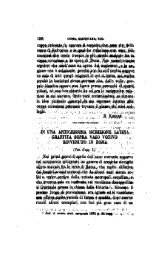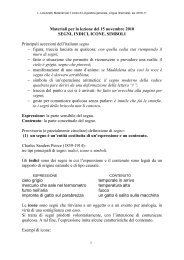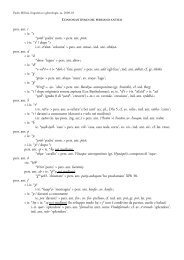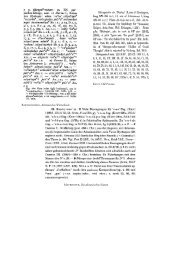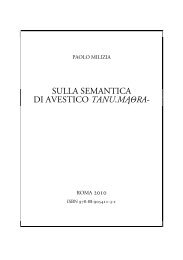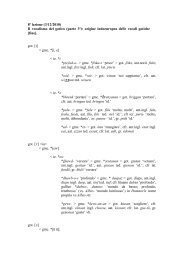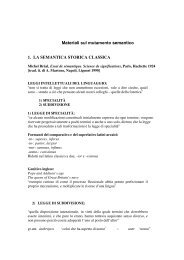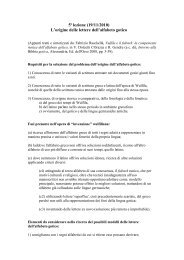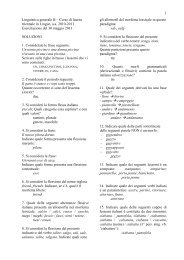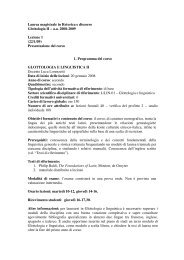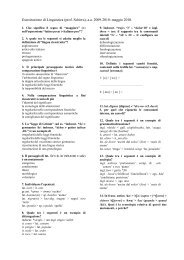Linguistic Society of America
Linguistic Society of America
Linguistic Society of America
Create successful ePaper yourself
Turn your PDF publications into a flip-book with our unique Google optimized e-Paper software.
THE INSCRIPTION OF DVENOS<br />
paretti,40 E. W. Fay,41 and now Goldmann,42 make the division at<br />
this point. In my opinion, there is only one interpretation <strong>of</strong> this phrase<br />
which is at all satisfactory, that <strong>of</strong> Ehrlich:43 MANO is a genitive plural,<br />
a euphemistic term for ghosts <strong>of</strong> the dead, for the archaic adjective<br />
madnus= bonus is adequately attested, and appears with another suffix<br />
in Manes Mdnium; and MEINOM is equivalent in meaning to munus<br />
(older *moinos), but has a different ablaut grade in the root and a<br />
slightly different suffix. Thus he interprets in Manium munLus 'as a<br />
gift to the Manes'. I should alter this to 'as a gift to the Deities <strong>of</strong><br />
Hell', understanding these deities as the three gods <strong>of</strong> the first line.<br />
Accordingly 'Duenos made me as a gift to the Deities <strong>of</strong> Hell; to<br />
Duenos let no evil arise through me.' But who or what is Duenos?<br />
The word may be a personal name, for there was a praenomen Bennus<br />
and a gentilicium Duennius or Bennius;44yet this was in any instance a<br />
rare name. On the other hand, DVENOS may be a mere descriptive<br />
adjective, = bonus, <strong>of</strong> which, if the nasal be not for the doubled nasal, it<br />
is certainly an older collateral form. In view <strong>of</strong> the rarity <strong>of</strong> the name<br />
Bennus and <strong>of</strong> the possibility that the execrator might desire to disguise<br />
his identity, I incline to the view that DVENOS is bonus 'a good man',<br />
uttered in earnest and not as a euphemism. It is likely that the loss <strong>of</strong><br />
mdnus 'good' in the language was due to its extensive use as a euphemism,<br />
especially in the derivative Manes, so that it lost its original meaning<br />
and its place was usurped by bonus. At the same time, there is a distinct<br />
possibility that in this third line, as well as in the first line, the initial<br />
word was written with a double value, DVENOS DVENOS 'Bennus, a<br />
good man'; though I do not insist that the actual name was Bennus, but<br />
was near enough in sound to DVENOS to give some appropriateness to<br />
the graphic representation. Whether or not this be so, the word denotes<br />
the execrator, either (as we shall later see) a private individual cursing a<br />
personal enemy, or a priest cursing a person who in some way has sinned<br />
against the deity served by the priest. It seems unlikely that F. D.<br />
Allen45 is right in taking it to refer to a pr<strong>of</strong>essional sorcerer who cast the<br />
spell; even less likely is it that it denotes the potter who made the vase,<br />
40 Museo ital. di antichitd classica 1. 175 ff. [1885].<br />
41 AJP 30. 121-38 [1909].<br />
42 Op. cit. 120.<br />
43 Untersuchungen iuber die Natur der griechischen Betonung 72, Berlin, 1912.<br />
u Cf. H. Jordan, Hermes 16. 237-8 [1881]; W. Deecke, RvhM 37. 385-6 [1882]; W.<br />
Schuize, Zur Geschichte lateinischer Eigennamen 423, 519, Berlin, 1904; A. Zimmermann,<br />
Philologus 72. 158 [1913].<br />
4 Harvard Studies in Classical Philology 9. 53-4 [18981.<br />
215



